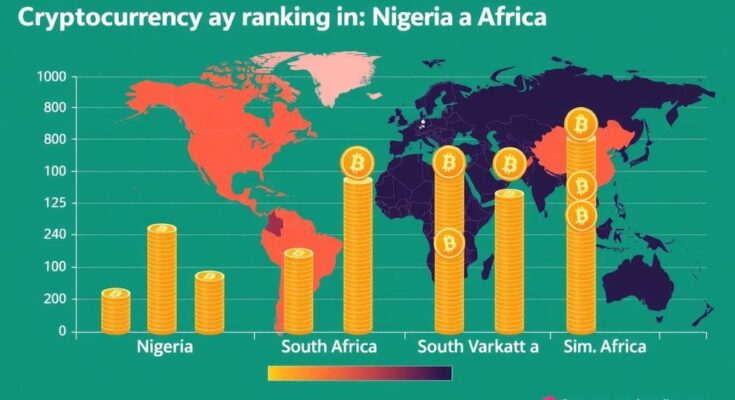A Consensys report ranks Nigeria and South Africa as top countries for cryptocurrency ownership, with 73% and 68% ownership rates respectively. Practical uses for crypto drive adoption amid low traditional bank access. Despite having only 2.7% of global transaction volumes, Africa saw $125 billion in on-chain value. Awareness of cryptocurrencies is nearly universal in these countries.
Recent findings from a Consensys report position Nigeria and South Africa as leading nations in cryptocurrency ownership, boasting remarkable rates of 73% and 68%, respectively. The surge in cryptocurrency adoption across Africa is significantly driven by practical applications, including utilizing digital assets for inflation protection, business transactions, and everyday retail purchases. This trend is corroborated by another study from Chainalysis, highlighting sub-Saharan Africa as a frontrunner in decentralized finance (DeFi) adoption due to the region’s low levels of traditional banking services.
Despite the evident enthusiasm for cryptocurrencies, it is important to note that Africa only contributes 2.7% to global transaction volumes, which underscores the continent’s relatively limited economic capacity. Nevertheless, cryptocurrency usage has witnessed notable advancements, with Africa receiving $125 billion in on-chain value transfers from July 2023 to June 2024. Furthermore, the Consensys report underscores high levels of cryptocurrency awareness, with 99% of Nigerians and 98% of South Africans indicating familiarity with digital currencies.
Cryptocurrency has emerged as a significant player in financial systems across various regions, with its utility recognized through practical use cases tailored to local economic conditions. In Africa, the challenges presented by inflation and limited access to traditional banking systems have stimulated increasing dependency on cryptocurrencies. Reports from reputable sources such as Consensys and Chainalysis provide critical insights into the adoption rates and the growing prevalence of decentralized finance in the continent. Understanding these dynamics is essential for assessing the global cryptocurrency landscape and recognizing the particular contributions of African nations.
In conclusion, Nigeria and South Africa distinctly lead global rankings in cryptocurrency ownership, primarily driven by practical utility in various economic activities. Although the continent still lags in overall transaction volume, the rapid increase in on-chain value transfers indicates a burgeoning interest and capability in cryptocurrency adoption. With near-universal awareness of digital currencies, the potential for growth in Africa’s crypto sector remains promising, indicating a shift in financial engagement on the continent.
Original Source: iafrica.com




